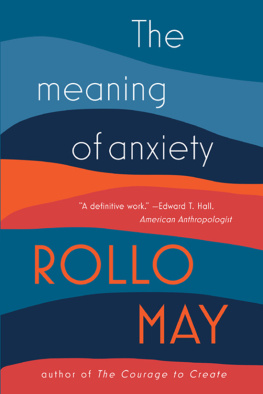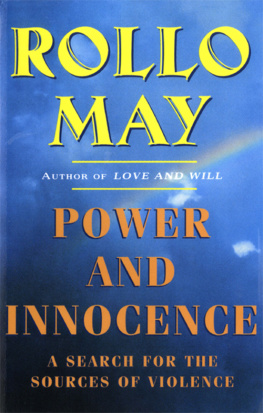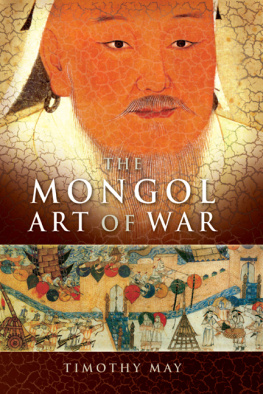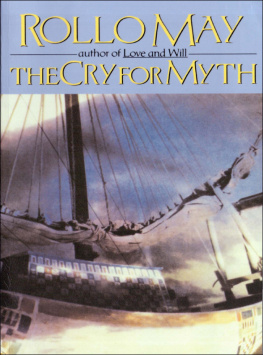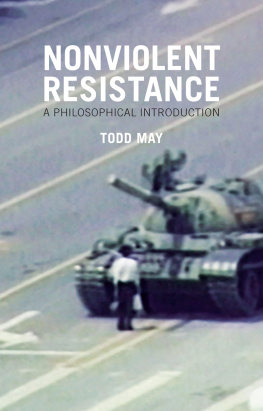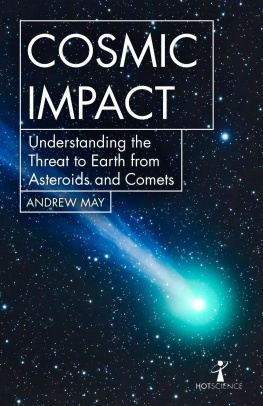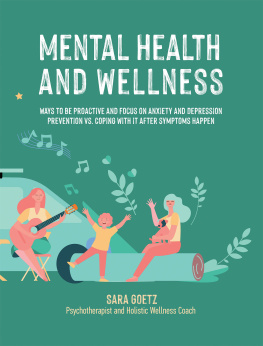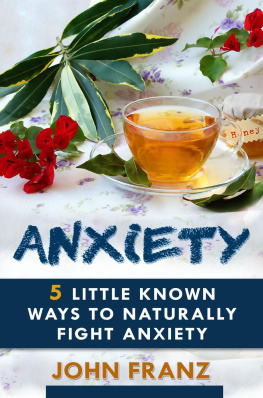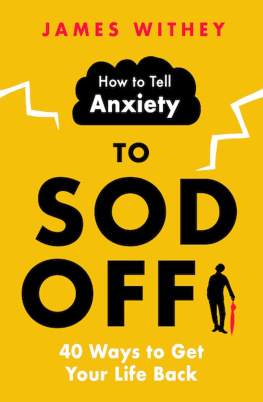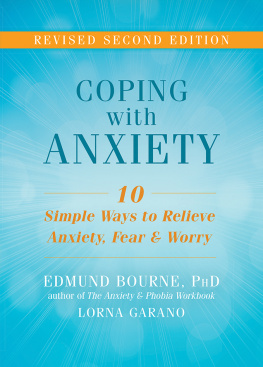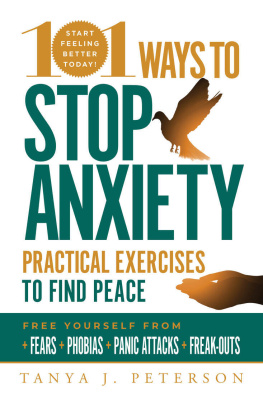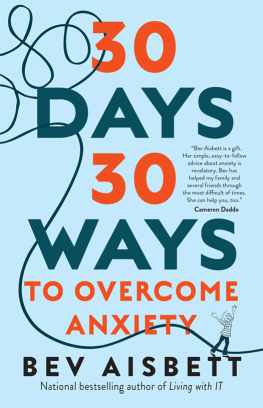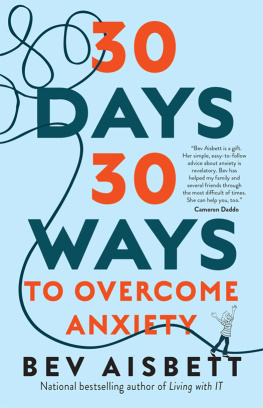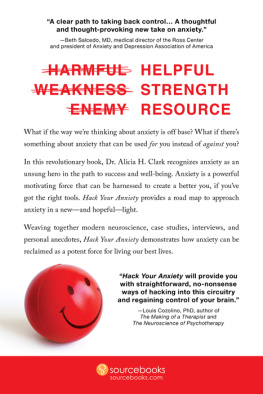
Copyright 1977 by Rollo May
Copyright 1950 by The Ronald Press Company
All rights reserved
Reissued in a Norton paperback edition 1996
Reissued 2015
For information about permission to reproduce selections from this book,
write to Permissions, W. W. Norton & Company, Inc.,
500 Fifth Avenue, New York, NY 10110
For information about special discounts for bulk purchases, please contact
W. W. Norton Special Sales at specialsales@wwnorton.com or 800-233-4830
Book design by Lovedog Studio
Production manager: Louise Mattarelliano
The Library of Congress has cataloged the printed edition as follows:
May, Rollo.
The meaning of anxiety.
Bibliography: p.
Includes index.
1. Anxiety I. Title.
BF575.A6M35 1977 152.4'34 77-1359
ISBN 0-393-31456-1
ISBN 978-0-393-35087-6
ISBN 978-0-393-24962-0 (e-book)
W. W. Norton & Company, Inc.
500 Fifth Avenue, New York, N.Y. 10110
www.wwnorton.com
W. W. Norton & Company Ltd.
Castle House, 75/76 Wells Street, London W1T 3QT
ROLLO
MAY |
THE
MEANING
OF
ANXIETY |
 |
| W. W.NORTON & COMPANY |
| NEW YORK |
T HIS BOOK IS THE RESULT OF SEVERAL YEARS OF EXPLO -ration, research, and thought on one of the most urgent problems of our day. Clinical experience has proved to psychologists and psychiatrists alike that the central problem in psychotherapy is the nature of anxiety. To the extent that we have been able to solve that problem, we have made a beginning in understanding the causes of integration and disintegration of personality.
But if anxiety were merely a phenomenon of maladjustment, it might well be consigned to the consulting room and the clinic and this book to the professional library. The evidence is overwhelming, however, that we live today in an age of anxiety. If one penetrates below the surface of political, economic, business, professional, or domestic crises to discover their psychological causes, or if one seeks to understand modern art or poetry or philosophy or religion, one runs athwart the problem of anxiety at almost every turn. The ordinary stresses and strains of life in the changing world of today are such that few if any escape the need to confront anxiety and to deal with it in some manner.
For the past hundred years, for reasons which will appear in the following chapters, psychologists, philosophers, social historians, and other students of humanity have been increasingly preoccupied with this nameless and formless uneasiness that has dogged the footsteps of modern man. Yet in all that time, to my knowledge, only two attempts have been made in book formone essay by Kierkegaard and one by Freudto present an objective picture of anxiety and to indicate constructive methods of dealing with it.
This study seeks to bring together in one volume the theories of anxiety offered by modern explorers in different areas of our culture, to discover the common elements in these theories, and to formulate these concepts so that we shall have some common ground for further inquiry. If the synthesis of anxiety theory presented here serves the purpose of producing some coherence and order in this field, a good part of my goal will have been achieved.
It is of course clear that anxiety is not merely an abstract theoretical concept, any more than swimming is to a person whose boat has capsized a mile from shore. A discussion of anxiety that was not geared to immediate human problems would not be worth either writing or reading. Hence the theoretical synthesis has been tested by investigation of actual anxiety situations and selected case studies to discover what concrete evidence there may be to support my conclusions as to what anxiety means and what purpose it serves in human experience.
In order to keep this study within manageable limits, I have restricted its scope to the observations of persons who are our contemporaries in all important respects, and even within these limits only the most significant figures. These are persons who represent Western civilization as we experience it, whether they are philosophers like Kierkegaard, psychotherapists like Freud, novelists, poets, economists, social historians, or others with keen insight into human problems. These restrictions in time and space serve to bring the problem of anxiety into sharp focus, but they should not be taken to imply that anxiety is exclusively a modern problem or solely a Western one. I hope that this book will stimulate similar surveys in other parts of the field.
Because of the vital general interest in the subject of anxiety, I have stated my findings so that they will be clear not only to professional readers but also to students, to social scientists, and to readers who seek a psychological understanding of modern problems. This book is in fact pertinent to the concerns of intelligent citizens who feel on their own pulse the tensions and anxiety-creating conflicts of our day and who have asked themselves what the meaning and causes of this anxiety may be and how the anxiety can be dealt with.
For those interested in a comparative survey of modern schools of psychotherapy, this volume should serve as a convenient textbook, presenting as it does the views of a dozen leaders in this field. There is no better way to understand these various schools than to compare their theories of anxiety.
During the years I was working on this book, my ideas on anxiety were sharpened and broadened by discussions with many professional colleagues and friends, too numerous to be mentioned here. But I wish to express appreciation to Dr. O. H. Mowrer, Dr. Kurt Goldstein, Dr. Paul Tillich, and Dr. Esther Lloyd-Jones, who read the manuscript at its various stages and who discussed with me through many stimulating hours the problem of anxiety in the fields they represent. I am also indebted for direct and indirect help in this study to Dr. Erich Fromm and other colleagues in the William Alanson White Institute of Psychiatry, Psychoanalysis and Psychology. A final word of appreciation is directed to the psychiatrist and the social workers at the institution in which the case studies of unmarried mothers were made. These colleagues gave expert help in the understanding of the cases, though for obvious reasons they must remain anonymous.
ROLLO MAY
New York, New York
February, 1950
S INCE THE FIRST EDITION OF THIS BOOK APPEARED IN 1950, there has been an enormous amount of research and interest in anxiety. In contrast to the fact that only two books were written on anxiety before 1950, a score of volumes were published in the last quarter century. And in contrast to the half-dozen papers exploring the subject before 1950, it has been estimated that at least 6,000 studies and dissertations on anxiety and tangential subjects have appeared since 1950. Anxiety has certainly come out of the dimness of the professional office into the bright light of the market place. I am gratified that the original Meaning of Anxiety spurred some of this surge of interest.
But with all the devoted efforts on the part of gifted persons, I know of no one who would claim that the riddle of anxiety has been solved. Our knowledge has increased but we have not learned how to deal with anxiety. Though the concept of normal anxiety, as advanced in the first edition of this book, has been generally accepted in theory, the implications of it have not been faced. We still cling to the illogical belief that mental health is living without anxiety. We seem unaware that the delusion of living without anxiety reveals a radical misperception of realitya point made inescapably clear in our day of atomic radiation and the hydrogen bomb.
Next page
